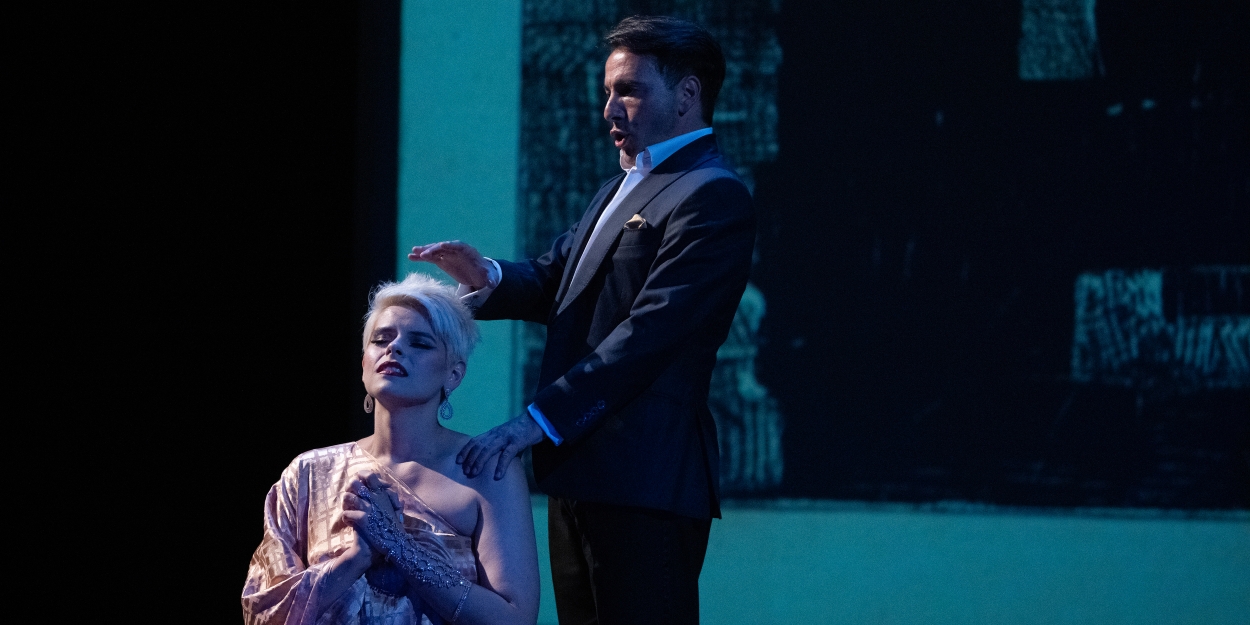Review: Splendid Donizetti Rarity POLIUTO Showed Its Great Bones via Crutchfield's Teatro Nuovo
Tenor Santiago Ballerini and Soprano Chelsea Lehnea Delivered Starry Performances under Musical Direction of Jakob Lehmann

Usually, when long-neglected works somehow find their way to the forefront, we find there’s a pretty good reason for the lack of interest. Happily for us, this did not apply to Donizetti’s POLIUTO, which Will Crutchfield’s Teatro Nuovo performed last weekend at Montclair State’s (NJ) Kasser Theatre and on July 19th at Jazz from Lincoln Center’s Rose Theatre.
It’s filled with wonderful music that the current performers--particularly the suave tenor of Argentine Santiago Ballerini in the title role and the potent American coloratura soprano Chelsea Lehnea--deliver with aplomb.
In other words, the performance by Teatro Nuovo showed that this was an opera worth waiting for.
To give you an idea of the level of Donizetti’s output at this point in his career (which produced 70-odd operas in total), think about this: If POLIUTO had premiered on schedule in 1838, it would have opened at the Teatro di San Carlo in Naples the year after the composer’s ROBERTO DEVEREUX, three years after LUCIA DI LAMMERMOOR debuted at the theatre (the same year that MARIA STUARDA first appeared at La Scala). It would have been five years after LUCREZIA BORGIA, six years after L’ELISIR D’AMORE arrived in Milan and eight years after ANNA BOLENA.
But it didn’t. The censors decreed that it was forbidden to represent (spoiler alert!) a Christian saint onstage as a jealous lover. Fit to be tied, Donizetti withdrew the work, then turned it into LES MARTYRS for the Paris Opera. POLIUTO didn’t have its Italian premiere until 1848, after the composer died.
With a cast headed by Ballerini and Lehnea, as Poliuto and Paolina (the eventual martyrs of the French title), the performance I attended clearly showed off the reasons that Maria Callas and Franco Correlli triumphed with the opera at La Scala and on disc. The action didn’t flag for a moment, under the supple conducting of Associate Artistic Director Jakob Lehmann (who was also Primo Violino) with the exciting and historically accurate orchestra of Teatro Nuovo and a wonderful chorus.
Oh, sure, one could quibble about certain aspects of the score; for example, I wished the tenor had more to do before the second of three acts (when Ballerini blew the roof off) and the Act II sextet doesn’t hold a candle to Donizetti’s similar ensemble in LUCIA.
But there was plenty of music worth hearing and cherishing, including the introductory baritone aria for the Proconsul Severo (Paolina’s thought-to-be-lost-love, sung with spirit by baritone Ricardo Jose Rivera, who only missed a little warmth in his delivery) and his duet--really a pair of dueling monologues--with Paolina that started Act II. When they finally engaged and she let her high notes soar, it was cheering time.
But, really, it was thrilling to hear just about everything that the soprano had to offer. Though Montclair’s Kasser theatre is on the small side, it sounded like Lehnea was the real find of the evening (since I’d previously heard and greatly appreciated Ballerini’s bel canto work at Caramoor under Crutchfield’s reign, in Donizetti’s LA FAVORITE as well as Bellini’s IL PIRATA opposite Angela Meade). I certainly look forward to hearing her again.
The singing of the supporting cast was generally on a high level, including tenors Krishna Raman as Paolina’s father, Felice and Robert Kleinertz as Nearco, leader of the Armenian Christians. Tenor James Danner and baritone Louise Floyd were a pair of Christians. Bass Hans Tashjian was Callistene, the High Priest of Jupiter. Again, there was some powerful work from the chorus as (sic) various Christians, Magistrates, Priests of Jove, Armenians and Roman warriors.
In all, Will Crutchfield should be congratulated for introducing POLIUTO to a new generation of American operagoers. (NB: A staged production by the tiny Amore Opera was done in New York in 2016 at the Sheen Center in the East Village.) I hope that some larger company picks up the gauntlet and gives us a chance to see it staged, although there were effective projections in this production (incorporating the translated libretto) using edited reproductions of the designs for LES MARTYRS by Louis Lucien Victor Devoir, Michel Pourchet, Charles Sechan, Leon Feuchere, Jules Dieterle, Edouard Desplechin and Pierre-Luc Charles Ciceri.
For more information about Teatro Nuovo, please see its website.
Photo: Steve Pisano
Reader Reviews

Videos

